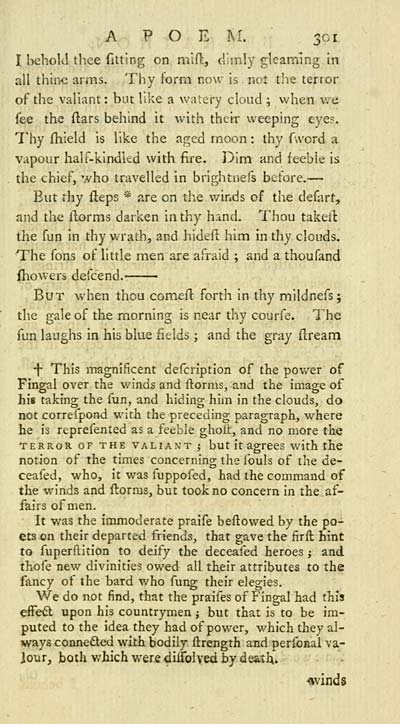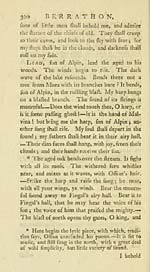Download files
Complete book:
Individual page:
Thumbnail gallery: Grid view | List view

A P O E IVI. 3GI
I behoUl tliee fitting on mift, dimly gleaming in
all thine arms. Thy form now is not the terror
of the valiant : but like a watery cloud ; when we
fee the ftars behind it with their weeping eye?.
'I'hy fhield is like the aged moon : thy fword a
vapour halF-klndlcd with fire. Dim and feeble is
the chief, '.vho travelled in brightnefs before. —
But rhy fleps * are on tlie v/inds of the defart,
and the llorms darken in thy hand. Thou takeit
the fun In thy wrath, and hidefl: him in thy clouds.
The fons of little men are afraid ; and a thoufand
fliowers defcend.
But when thou comefl forth in thy mildnefs;
the gale of the morning is near thy courfe. The
fun laughs in his blue fields ; and the gray flream
-|- This magnificent defcription of the power of
Fingal over the winds and ftornis, and the image of
his taking the fun, and hiding him in the clouds, do
not correfpond with the preceding paragraph, where
he is reprefented as a feeble glioil, and no more the
TERROR OF THE VALIANT j but ft agrees with the
notion of the times concerning the fouls of the de-
ceafed, who, it was fuppofed, had the command of
the winds and ftorras, but took no concern in the. af-
fairs of men.
It was the immoderate praife beftowed by the po-
ets on their departed friends, that gave the firft hint
to fuperftition to deify the deceafed heroes ; and
thofe new divinities owed all their attributes to the
fancy of the bard who fung their elegies.
V/e do not find, that the praifes of Fingal had this
effect upon his countrymen ; but that is to be im-
puted to the idea they had of power, which they al-
ways connected with bodily ftrength and perfonal va-
lour, both which were diifolved by desuh.
«vinds
I behoUl tliee fitting on mift, dimly gleaming in
all thine arms. Thy form now is not the terror
of the valiant : but like a watery cloud ; when we
fee the ftars behind it with their weeping eye?.
'I'hy fhield is like the aged moon : thy fword a
vapour halF-klndlcd with fire. Dim and feeble is
the chief, '.vho travelled in brightnefs before. —
But rhy fleps * are on tlie v/inds of the defart,
and the llorms darken in thy hand. Thou takeit
the fun In thy wrath, and hidefl: him in thy clouds.
The fons of little men are afraid ; and a thoufand
fliowers defcend.
But when thou comefl forth in thy mildnefs;
the gale of the morning is near thy courfe. The
fun laughs in his blue fields ; and the gray flream
-|- This magnificent defcription of the power of
Fingal over the winds and ftornis, and the image of
his taking the fun, and hiding him in the clouds, do
not correfpond with the preceding paragraph, where
he is reprefented as a feeble glioil, and no more the
TERROR OF THE VALIANT j but ft agrees with the
notion of the times concerning the fouls of the de-
ceafed, who, it was fuppofed, had the command of
the winds and ftorras, but took no concern in the. af-
fairs of men.
It was the immoderate praife beftowed by the po-
ets on their departed friends, that gave the firft hint
to fuperftition to deify the deceafed heroes ; and
thofe new divinities owed all their attributes to the
fancy of the bard who fung their elegies.
V/e do not find, that the praifes of Fingal had this
effect upon his countrymen ; but that is to be im-
puted to the idea they had of power, which they al-
ways connected with bodily ftrength and perfonal va-
lour, both which were diifolved by desuh.
«vinds
Set display mode to: Large image | Transcription
Images and transcriptions on this page, including medium image downloads, may be used under the Creative Commons Attribution 4.0 International Licence unless otherwise stated. ![]()
| Early Gaelic Book Collections > Ossian Collection > Fingal, an ancient epic poem > (339) |
|---|
| Permanent URL | https://digital.nls.uk/77450994 |
|---|
| Description | Selected books from the Ossian Collection of 327 volumes, originally assembled by J. Norman Methven of Perth. Different editions and translations of James MacPherson's epic poem 'Ossian', some with a map of the 'Kingdom of Connor'. Also secondary material relating to Ossianic poetry and the Ossian controversy. |
|---|
| Description | Selected items from five 'Special and Named Printed Collections'. Includes books in Gaelic and other Celtic languages, works about the Gaels, their languages, literature, culture and history. |
|---|

